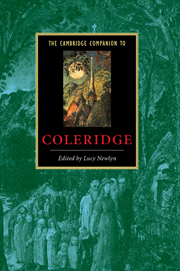13 - Gender
from Part III - Themes and topics
Published online by Cambridge University Press: 28 May 2006
Summary
Coleridge was not a feminist, although he included women amongst his best friends. Nor was his work directed systematically at issues of gender, definitions of masculinity and femininity, or the relations between the sexes, except as these matters intersected with other topics that fundamentally informed his work such as the French Revolution, social reform, faculties of mind, the professionalisation of poetry and the poet. Still, Coleridge is useful for thinking about gender and its articulation in the early nineteenth century, occasionally in what he wrote and more frequently in what he 'was' as writer and man. To proclaim in the early 1800s that 'there is a sex in our souls' when the revolution in female manners was being conducted on the opposite principle and was barely off the ground was to disassociate oneself from feminist causes and to align oneself with gender essentialists (Friend ii, 209). Most of Coleridge's comments on gender supported the social conservatism that usually follows from essentialist claims. They positioned women in the private sphere, viewed love as women's primary preoccupation, and characterised femininity as maternal, nurturing, dependent, and domestic. Even Coleridge's advocacy of androgyny, regarded ever since Virginia Woolf as his major positive contribution to gender analysis, supported a masculinist agenda, for it was attributed only to the genius of male minds.
- Type
- Chapter
- Information
- The Cambridge Companion to Coleridge , pp. 203 - 216Publisher: Cambridge University PressPrint publication year: 2002
- 2
- Cited by

